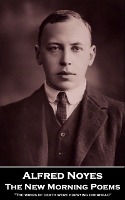Alfred Noyes was born on the 16th September, 1880 in Wolverhampton, England.
When Noyes was four, the family moved to Aberystwyth in Wales where his father now taught Latin and Greek and encouraged his son's education and love for literature. The beautiful Welsh coast and mountains were a lifetime inspiration for his later lyrical poetry.
His classical literature studies at Exeter College, Oxford were sidelined by his time spent rowing and writing. Instead of sitting his finals, he met with a publisher about releasing 'The Loom of Years'. Despite failing to get a degree, the critical acclaim to his volume established him as a promising new voice in English poetry.
'The Highwayman' in 1906 cemented Noyes's reputation. Its rhythmic and vivid storytelling, became immensely popular and remains one of his best-known works.
These early successes led to a prolific period of numerous poetry volumes, primarily with a romantic and idealised vision of England, with its historical and mythical past and natural beauties of the landscape.
In 1907, he married the American Garnett Daniels, and this led to frequent travels across the Atlantic. He became a lecturer, often on world peace and disarmament, and a visiting professor at various American universities which further broadened his influence and readership.
During World War I, his defective eyesight meant his military service was on attachment to the Foreign Office, where he worked with John Buchan on propaganda, despite he himself being an outspoken pacifist and his detestation of war.
Noyes also wrote several novels and short stories though poetry was by far the main claimant on his talents.
He faced several personal challenges especially after the death of his wife in 1926. He later remarried, to Mary Angela and converted to Roman Catholicism, which particularly influenced his later works.
Noyes continued writing and lecturing throughout his life and remained both a significant figure in literary circles and decidedly popular among the reading public.
Alfred Noyes died on the 25th June, 1958, on the Isle of Wight. He was 77.

